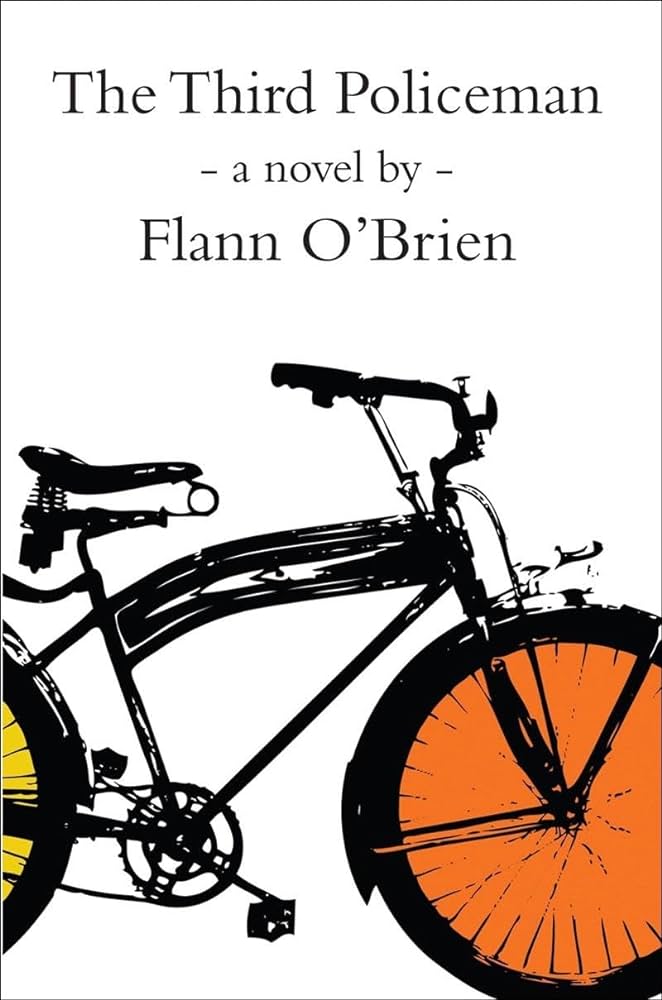 The Third Policeman by Flann O’Brien is a surreal and darkly comedic novel that follows the protagonist, an unnamed narrator, as he navigates a bizarre world that defies the laws of physics and reason. The plot unfolds in rural Ireland and centers around the narrator’s obsession with the eccentric philosopher De Selby and his quest for a hidden fortune.
The Third Policeman by Flann O’Brien is a surreal and darkly comedic novel that follows the protagonist, an unnamed narrator, as he navigates a bizarre world that defies the laws of physics and reason. The plot unfolds in rural Ireland and centers around the narrator’s obsession with the eccentric philosopher De Selby and his quest for a hidden fortune.
The narrator, in cahoots with his accomplice Divney, commits a murder to secure the funds needed for their treasure hunt. However, events take a surreal turn as the narrator finds himself in a purgatorial landscape governed by strange laws and presided over by the mysterious and absurdly humorous third policeman.
As the narrative weaves through themes of identity, time, and the nature of reality, the plot becomes a labyrinth of absurdity, challenging the reader to decipher the layers of meaning beneath the surreal surface.
Characters
The Narrator: An unnamed and unreliable narrator, he is obsessed with the works of De Selby and becomes embroiled in a series of bizarre events after committing a murder to finance a treasure hunt. His character is a conduit for the novel’s exploration of existential questions, absurdity, and the unreliable nature of perception.
Divney: The narrator’s accomplice in the ill-fated quest for treasure, Divney adds a layer of dark humor to the narrative. His character serves as both a foil and partner to the narrator, contributing to the novel’s comedic and enigmatic elements.
De Selby: A fictional philosopher whose works play a central role in the novel’s intellectual landscape. De Selby’s absurd theories on time, existence, and perception become a lens through which the characters grapple with the surreal events unfolding around them.
The Third Policeman: A mysterious and surreal figure, the third policeman embodies the absurdity of the novel’s world. With his bizarre theories and comically skewed perspective, he becomes a symbol of the irrational forces at play in the narrative.
The characters in “The Third Policeman” are not conventional in their motivations or actions, adding to the novel’s sense of unpredictability and eccentricity.
The Third Policeman Ending Explained
Note: Spoiler Alert
“The Third Policeman” concludes with a mind-bending revelation that challenges the reader’s understanding of the narrative. The novel suggests that the narrator, after a series of surreal events, has entered a bizarre afterlife where he is condemned to relive his own life in a loop.
The revelation involves the concept of “atomic transmutation,” where individuals gradually transform into objects they frequently interact with. The narrator, in his obsession with bicycles, undergoes a metamorphosis into a bicycle. This transformation is part of the cyclical nature of existence in the novel, where characters are trapped in a perpetual loop of their own actions.
The ending can be interpreted as a commentary on the consequences of one’s choices and the cyclical nature of existence. It raises questions about the nature of reality, identity, and the possibility of escaping the repetitive cycle. The novel’s conclusion invites readers to reflect on the absurdity of life and the consequences of one’s actions in a universe governed by its own peculiar logic.
Frequently Asked Questions
Is It based on a true story? No, “The Third Policeman” is a work of fiction. Flann O’Brien, a master of Irish literature, crafted a surreal and absurdist narrative that transcends conventional storytelling. While the novel draws on philosophical ideas and literary influences, the events and characters are entirely fictional.
What is the main idea of the book? “The Third Policeman” explores themes of existentialism, absurdity, and the consequences of one’s actions. The novel challenges traditional narrative structures and engages with philosophical concepts, particularly those related to time, identity, and the nature of reality. It serves as a unique blend of dark humor, intellectual exploration, and surreal storytelling.
Is this book worth reading? Absolutely. “The Third Policeman” is a literary masterpiece that offers a unique and thought-provoking reading experience. Its blend of dark comedy, philosophical depth, and surreal narrative make it a standout work in the realm of Irish literature. If you enjoy novels that challenge conventional storytelling and delve into existential themes, this book is a must-read.
What is the symbolism in this book? Symbolism permeates “The Third Policeman,” with bicycles being a prominent motif. Bicycles represent the novel’s exploration of identity, transformation, and the cyclical nature of existence. The atomic transmutation of characters into objects reflects the consequences of obsession and the surreal consequences of individual choices. The third policeman himself symbolizes the irrational and absurd forces that govern the novel’s universe.
Can you recommend me any other interesting books of this author? Certainly. If you appreciate Flann O’Brien’s unique style and absurdist humor, “At Swim-Two-Birds” is another masterpiece that blends metafiction with Irish folklore. O’Brien’s wit and literary experimentation shine through in both novels, making them essential reads for those intrigued by unconventional storytelling.
Can you recommend me other interesting books in the similar genre? For readers who enjoy surrealism, dark comedy, and philosophical exploration, Jorge Luis Borges’ “Labyrinths” offers a collection of short stories that delve into similar themes of identity, reality, and the nature of storytelling. Samuel Beckett’s “Waiting for Godot” is a classic play that captures the absurdity of existence and has thematic resonances with “The Third Policeman.” Both works provide intellectually stimulating experiences within the realm of absurd literature.

